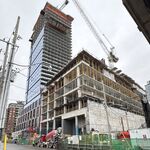interested
Senior Member
One further thought, my comment about real estate being local is that it is a bit difficult to compare Sudbury to Ottawa to Toronto. Even within the city and closer to the core, unless Toronto goes the way of Detroit, I believe the core will not suffer as much. Yes, there will be a steep correction but I believe that would just result in people living in the suburbs taking advantage to move into the city (to save gas and time). So, I think the burbs (and I am one of the suburbanites) have more risk than say mid town Toronto.
Downtown I think is unique and has a distinct appeal.
The core is "different" I believe in Toronto than other markets. I am not saying it can't get blindsided and prices drop significantly, I just believe there is probably enough 20-40 year olds and perhaps older people (60+) who if afforded the ability to live in the Core at reasonable prices compared with todays prices would take advantage of it, thereby limiting the downside of the Core, if not in valuation, in duration of the time to recovery compared to other areas.
Downtown I think is unique and has a distinct appeal.
The core is "different" I believe in Toronto than other markets. I am not saying it can't get blindsided and prices drop significantly, I just believe there is probably enough 20-40 year olds and perhaps older people (60+) who if afforded the ability to live in the Core at reasonable prices compared with todays prices would take advantage of it, thereby limiting the downside of the Core, if not in valuation, in duration of the time to recovery compared to other areas.




